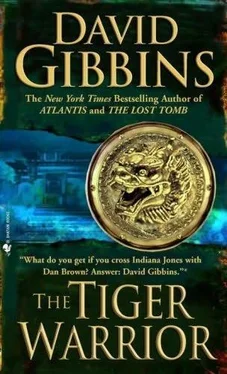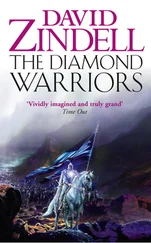David Gibbins - The Tiger warrior
Здесь есть возможность читать онлайн «David Gibbins - The Tiger warrior» весь текст электронной книги совершенно бесплатно (целиком полную версию без сокращений). В некоторых случаях можно слушать аудио, скачать через торрент в формате fb2 и присутствует краткое содержание. Жанр: Прочие приключения, на английском языке. Описание произведения, (предисловие) а так же отзывы посетителей доступны на портале библиотеки ЛибКат.
- Название:The Tiger warrior
- Автор:
- Жанр:
- Год:неизвестен
- ISBN:нет данных
- Рейтинг книги:4 / 5. Голосов: 1
-
Избранное:Добавить в избранное
- Отзывы:
-
Ваша оценка:
- 80
- 1
- 2
- 3
- 4
- 5
The Tiger warrior: краткое содержание, описание и аннотация
Предлагаем к чтению аннотацию, описание, краткое содержание или предисловие (зависит от того, что написал сам автор книги «The Tiger warrior»). Если вы не нашли необходимую информацию о книге — напишите в комментариях, мы постараемся отыскать её.
The Tiger warrior — читать онлайн бесплатно полную книгу (весь текст) целиком
Ниже представлен текст книги, разбитый по страницам. Система сохранения места последней прочитанной страницы, позволяет с удобством читать онлайн бесплатно книгу «The Tiger warrior», без необходимости каждый раз заново искать на чём Вы остановились. Поставьте закладку, и сможете в любой момент перейти на страницу, на которой закончили чтение.
Интервал:
Закладка:
“It must have been pestilential, during the monsoon,” Hiebermeyer said.
Jack nodded. “Rampa had all the extremes of jungle warfare, in common with the jungle campaigns of the following century, in Burma, Malaysia, Vietnam. Malaria was a huge problem. A few years later, the surgeon-major of the Madras Sappers was Ronald Ross, later Sir Ronald Ross, the man who confirmed the link between mosquitoes and malaria. But at the time of the rebellion there was limited understanding of it and the men dropped like flies. And that’s where Howard’s Indian background comes into play. He had some resistance to the fever, and that must have been a factor in his continued deployment. He was the only officer fit enough to do the job.”
Costas pulled back the hammer and rotated the cylinder on the old revolver, a long, elegant piece which had turned a plum color where the blueing on the metal had come away. “Eighteen fifty-one Colt Navy, London make,” he said. “I used to shoot one of these with an uncle of mine in Vermont who was a black powder enthusiast.” He turned the pistol over and traced his fingers over the letters and numbers stamped into the wooden grips. “Army markings?”
“That’s UC, Upper Canada, the letter A for the Frontenac Troop, number fifty,” Jack explained. “This was one of a batch of revolvers bought from Colt’s London factory to arm cavalrymen of the Canadian militia, based in Kingston on Lake Ontario. The surgeon of the Madras Sappers, Dr. Walker, had grown up in Kingston, served in the militia himself and acquired this pistol as surplus in the 1870s when the militia converted to cartridge revolvers. Walker took it to India and gave it to Howard to complement an identical Colt revolver he’d inherited from his father, who used it during the Indian Mutiny. Always best to have a pair of cap-and-ball revolvers, as they took so long to reload.”
“Where’s the other one?”
“Howard took it with him when he disappeared.”
“Disappeared?”
“One day years later in northern India he packed his bag and left, never to return. No one knows for certain where he went or what happened to him. I’ve been obsessed with it ever since I heard the story as a boy. I used to read Kipling, and accounts of explorers on the Silk Road, and imagine him on some great final adventure. He’s always been there in my mind when I’ve gone off on quests of my own. Now that we’re so close to the jungle, to actually being on his trail, I’d love to get to the bottom of it. But more about that later. Let’s not jump the gun.”
“I’ve found something on the rebellion,” Rebecca said, holding up a notebook with Victorian marblized covers and faded ink handwriting on a label. “The Rampa Expedition 1879, by John Howard, Lieutenant, R.E.”
“That’s his diary,” Jack said. “It’s the only personal account to survive from the rebellion. Almost everything else I’ve reconstructed from records in the India Office collections in the British Library, from the military and judicial proceedings of the Madras government which oversaw the jungle tracts. The rebellion was overshadowed by the Afghan War, and pretty well lost to history.”
Rebecca carefully opened a page, then began to read. “The difficulties of surveying really begin when the mapping is being pushed forward into an unknown country, especially if the surveyors are hampered with having to keep with troops, and their vision frequently obstructed by bad weather”
Jack nodded. “Survey was his specialty. He’d just come out of the School of Military Engineering at Chatham, two years of intensive training. There’s a lot of youthful enthusiasm in the first pages of the diary. But that soon changes.”
Rebecca read another section toward the end of the book. “The causes of that outbreak have been fully described; the administration was slack; our officers turned a deaf ear to the complaints of an oppressed people, and the ancient spirit which appealed to the sword at length asserted itself, amongst a brave and hearty race of mountaineers. Once that spirit is roused, and we are forced into a campaign in a wild, difficult and malarious tract-no man can say how long the petty warfare will last, or what slumbering elements of disorder will be stirred up against us. All that can be predicted is that the enemy will seldom be seen, that fever will fill the regimental hospitals, and that when peace comes at last, it will be the peace of desolation. All that these hill clans require of us is that we shall protect them in the tranquil enjoyment of the few contracted and simple objects of personal liberty and comfort which constitute the main sources of their happiness”
“Love the language,” Costas murmured.
“That pretty well sums it up,” Jack said. “Years later the Indian nationalist movement tried to make out that the rebellion was part of a general uprising against the British, but that’s revisionist history at its worst. These were jungle people who basically wanted to be left alone. Most of them had never even seen a European face before. Their main contact with the outside world had been with lowland people, with corrupt Indian police constables and with traders who extorted them. There was little economic gain for the British in the jungle and they put less competent officials in charge, a lower grade of district officer who rarely bothered to inspect the tracts themselves. Then the Indian Forestry Act interfered with their traditional slash-and-burn agriculture. But the spark was some petty official in Calcutta failing to exempt the hill peoples from the abkari tax on alcohol. The jungle people lived for their toddy, the palm liquor which sustained them through the monsoon months when there was nothing else to do.”
“I see what you mean,” Costas murmured. “Not exactly a glorious war. A long way from the geopolitics of Afghanistan.”
“But war was still war,” Jack said. “Take away grand strategic purpose, and you question far more. And these officers were a long way from the closed-mind, stiff-upper-lip caricature. The Royal Engineers attracted men of high intellect and curiosity. Today they’d be scientists, civil engineers, explorers. Much of what we know about the anthropology and natural history of India comes from what these men did in their spare time. And much of their work was not spent soldiering, but in surveying and mapping, and building roads, bridges, dams, aqueducts and irrigation systems, railways, public monuments, the infrastructure of the nation today. You had to speak the language to operate effectively in India, and many of these officers were gifted linguists, empathetic with their soldiers and the people around them. You can see that in the diary. The tone may seem a little lofty to us today, but guys like Howard saw human beings in their gun sights, not primitive tribals. They were tough soldiers, unswervingly loyal to the British crown, and would kill without hesitation, but they knew they were not always on the moral high ground.”
“There’s a reference to a book here, on the final page of the diary with writing on it,” Rebecca said. “It’s all smudged black.” She lifted the book and sniffed it, pulling a face. “It stinks like rotten eggs.”
“Black powder residue,” Jack said. “He must have had it on his hands when he wrote that. He’d have just been shooting. Look at the date. Twentieth August 1879.”
“I can barely read it, but the note says, Campbell, Wild Tribes of Khondistan, page 177. Then it says, Lord help me.”
Jack took one of the two leather-bound volumes from the drawer and opened it to a marked page. “This is the actual book. He had it with him when he wrote that final diary entry. In the margin of the book he’s written, Captain Frye, an admirable officer, an oriental scholar of the highest rank, who occupied himself most zealously in the acquisition of the Khond language. He clearly wrote that some time earlier, perhaps when he’d first read the book before going into the jungle. But the passage of text beside the note is circled in the same ink as that last diary entry, slightly smudged. He must have read it again that day in the jungle. Listen to this:
Читать дальшеИнтервал:
Закладка:
Похожие книги на «The Tiger warrior»
Представляем Вашему вниманию похожие книги на «The Tiger warrior» списком для выбора. Мы отобрали схожую по названию и смыслу литературу в надежде предоставить читателям больше вариантов отыскать новые, интересные, ещё непрочитанные произведения.
Обсуждение, отзывы о книге «The Tiger warrior» и просто собственные мнения читателей. Оставьте ваши комментарии, напишите, что Вы думаете о произведении, его смысле или главных героях. Укажите что конкретно понравилось, а что нет, и почему Вы так считаете.












